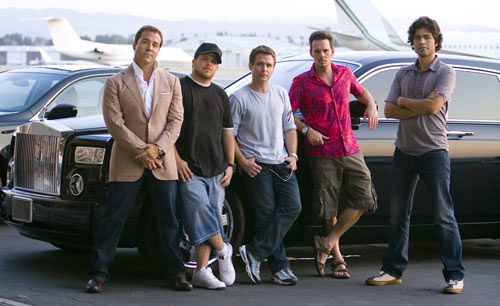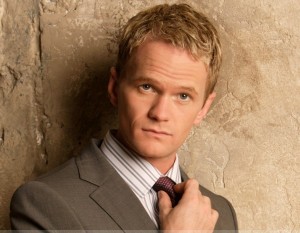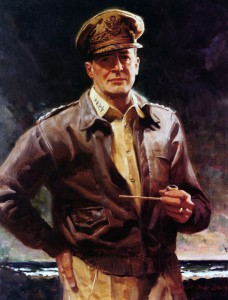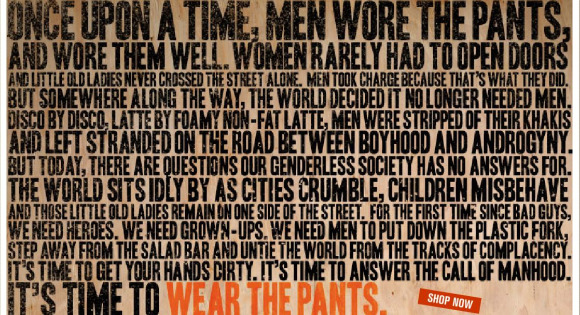Prove It
 There’s an aspect to manliness that I haven’t mentioned on the site, to date, and I want to bring it into the fold. The aspect of “proving your manliness” is an underlying requirement to achieving TrueManhood. Throughout all of time, in great civilizations and in small, young boys have had to prove their ability to be considered a man by the rest of the men. Whether it was killing an animal, conquering a task, going on an adventure or enduring a trial of some sort, young boys weren’t considered a part of the group of men unless they accomplished the task. Proving one’s manliness is something that we have forgotten in America.
There’s an aspect to manliness that I haven’t mentioned on the site, to date, and I want to bring it into the fold. The aspect of “proving your manliness” is an underlying requirement to achieving TrueManhood. Throughout all of time, in great civilizations and in small, young boys have had to prove their ability to be considered a man by the rest of the men. Whether it was killing an animal, conquering a task, going on an adventure or enduring a trial of some sort, young boys weren’t considered a part of the group of men unless they accomplished the task. Proving one’s manliness is something that we have forgotten in America.
How can we get back to proving one’s manliness, especially in light of the requirements that our world puts out there for guys “to be manly”? How can we get back to this when what we talk about most on the site, in regards to TrueManhood, is virtue? I think the answer lies somewhere between the older men (fathers, grandfathers, senior men, etc.) setting an example of manliness and the young-to-middle-aged-men who have proven themselves as TrueMen to hold a standard of excellence as the requirements for boys and young men who have yet to prove themselves as TrueMen.  Somewhere along the way, we let go of the standard of excellence and now we are faced with the cultural issues of boys acting as if life was a fast action, shoot ’em up movie or the opposite, where we have overly-effeminate males walking around aimlessly.
Somewhere along the way, we let go of the standard of excellence and now we are faced with the cultural issues of boys acting as if life was a fast action, shoot ’em up movie or the opposite, where we have overly-effeminate males walking around aimlessly.
Why would proving manliness change anything? Well, if young boys/men knew that they had to prove their manliness (note: this must happen through a rigorous process of proving that their actions are consistently ordered towards the good) before they could ask a girl on a date, before they could have a job, before they could have any responsibility, etc. I think it would greatly change the level of importance put on manliness, which is needed in the worst way.
Man up!
Fighting Cultural Manliness
 Society makes suggestions to us, either directly or indirectly, about what’s manly and what’s not. Typically, society paints a picture that “cultural manliness” stems from all or part of the following: POWER, MONEY, SEX and STUFF. Society calls a man who possesses these things a “real man”. Separately, and in the right context, these attributes are wonderful, and add nicely to life. When used out of context, they can become disastrous. If a male possesses one (or more) of these attributes, than he automatically racks up points on an invisible ‘man scale’. A given amount of points on the cultural manliness scale doesn’t necessarily gain a guy anything, and it’s not like he can cash those points in for anything tangible. Nor is this something that guys sit around and discuss, it just sort of “is”. It comes from movies and music, tv and the internet. It’s the machismo mindset. However, because of the picture that is painted, a man with lots of points is (for whatever reason) elevated to a higher level than a regular Joe. As this happens, men being elevated and esteemed for what they possess and/or what they have done, other men desire to emulate these “real men” and therefore, “get what he has and do what he’s done.” Other men begin to shoot for power, money, sex and stuff, instead of what really determines what manliness is.
Society makes suggestions to us, either directly or indirectly, about what’s manly and what’s not. Typically, society paints a picture that “cultural manliness” stems from all or part of the following: POWER, MONEY, SEX and STUFF. Society calls a man who possesses these things a “real man”. Separately, and in the right context, these attributes are wonderful, and add nicely to life. When used out of context, they can become disastrous. If a male possesses one (or more) of these attributes, than he automatically racks up points on an invisible ‘man scale’. A given amount of points on the cultural manliness scale doesn’t necessarily gain a guy anything, and it’s not like he can cash those points in for anything tangible. Nor is this something that guys sit around and discuss, it just sort of “is”. It comes from movies and music, tv and the internet. It’s the machismo mindset. However, because of the picture that is painted, a man with lots of points is (for whatever reason) elevated to a higher level than a regular Joe. As this happens, men being elevated and esteemed for what they possess and/or what they have done, other men desire to emulate these “real men” and therefore, “get what he has and do what he’s done.” Other men begin to shoot for power, money, sex and stuff, instead of what really determines what manliness is.
What is real manliness??? Or, in our case, TrueManhood??? If real manliness isn’t power, money, sex and stuff, what is it? Where can we find out? What can we do to become really manly? Well, we’re given lots of great examples throughout history of what NOT to do and what’s NOT really manly. Where do we go to find good examples? I’d like to point to a few perfect examples of what manliness is using three Biblical characters.
1. After a storied youth, this man fell away from God and screwed up royally. He engaged in sins of the flesh which led to men dying and problems for others around him. However, instead of remaining lazy and indifferent, he heeded the words of his dear friend and decided to better himself and devoted his life to serving, honoring and praising God. He became faithful, prayerful and humble. He set an example of great virtue for others to see. He, like us, sinned – but repented, asking for forgiveness and continue to grow in holiness.
2. This man was wronged at an early age. After spending many years in confinement for crimes he hadn’t committed, he rose in the ranks and eventually became the king’s trusted advisor. Instead of taking vengeance on the men who wronged him, he chose love, honor and service. This man was a humble and faithful servant to God, never losing his foundation of prayer, trust and faith. An incredible witness of how to work through hardships.
3. This man was given, quite possibly, the hardest task a human father could be given. He was asked to take on a role that no other father had ever been asked to do, but he readily accepted and because he was a virtuous man, he succeeded in this difficult task. Because he trusted God (and His messenger), this man remained faithful and obedient. Due to his successful job-well-done, all men have a perfect example of what it means to be a chaste husband, a loving father and a hard worker.
What is TrueManhood? From these three examples, we see a theme: these three men were virtuous. Their virtue (especially their theological virtue of faith) allowed them to persevere and to continue to serve God.
The idea of cultural manliness is that, as you accumulate more wealth, as you sleep with more women, as you buy more stuff and as your power “ranking” goes up, the more manly you are. Cultural manliness never takes into account your virtue, your faith, your relationship with God and/or others, how you treat your wife, children, family, friends, strangers, etc. Cultural manliness is a facade, a lie, a demeaning and empty way of living. The glamour of being a “culturally manly” man will wear off in time. How many people will a culturally manly man hurt along the way?
your power “ranking” goes up, the more manly you are. Cultural manliness never takes into account your virtue, your faith, your relationship with God and/or others, how you treat your wife, children, family, friends, strangers, etc. Cultural manliness is a facade, a lie, a demeaning and empty way of living. The glamour of being a “culturally manly” man will wear off in time. How many people will a culturally manly man hurt along the way?
I call this cultural manliness for a reason, a simple reason. The culture is expressing the thought that everyone, man or woman, is in this world on their own, free to make up their own truth, free to generate their own spirituality from within. A man simply goes after what he wants, and his list of wants comes from what gives him pleasure. Seeking pleasure is what drives his actions and pleasure is often the only motive behind actions.
The Biblical characters described above are, in order: King David, Joseph of the Old Testament and St. Joseph, Patron Saint of Fathers and Workers.
A Father’s Prayer
 A Father’s Prayer by Douglas MacArthur
A Father’s Prayer by Douglas MacArthur
In early 1942, when heading out-numbered United States forces in the Philippines, the late General Douglas MacArthur prayed this prayer many times at morning devotions, according to Major General Courtney Whitney, his long-time military aide. This prayer for his son, Arthur, is a spiritual legacy any son would cherish.
“Build me a son, O Lord, who will be strong enough to know when he is weak, and brave enough to face himself when he is afraid; one who will be proud and unbending in honest defeat, and humble and gentle in victory.
Build me a son whose wishes will not take the place of deeds; a son who will know Thee-and that to know himself is the foundation stone of knowledge.
Lead him, I pray, not in the path of ease and comfort, but under the stress and spur of difficulties and challenge. Here let him learn to stand up in the storm; here let him learn compassion for those who fail.
Build me a son whose heart will be clear, whose goal will be high; a son who will master himself before he seeks to master other men; one who will reach into the future, yet never forget the past.
And after all these things are his, add, I pray, enough of a sense of humor, so that he may always be serious, yet never take himself too seriously. Give him humility, so that he may always remember the simplicity of true greatness, the open mind of true wisdom, and the meekness of true strength.
Then, I, his father, will dare to whisper, “I have not lived in vain.”
Man up!
TrueManhood’s Guide to Virtue
Click for TrueManhood’s Guide to Virtue
LEARN VIRTUE, LIVE VIRTUE!
Man up!
Man-ifesto, Needs Context
 A message about the Docker’s “Man-ifesto” came through my inbox today and I wanted to draw some attention to it. The point of what Dockers is trying to do comes across, however, I think it needs some explanation in order to make it better. This explanation sets the context of what manhood is, why it is vital and how a man can live TrueManhood.
A message about the Docker’s “Man-ifesto” came through my inbox today and I wanted to draw some attention to it. The point of what Dockers is trying to do comes across, however, I think it needs some explanation in order to make it better. This explanation sets the context of what manhood is, why it is vital and how a man can live TrueManhood.
I really like the parts about gentlemanly behavior. I tend to believe that chivalry is dying, but I know that it can be resurrected from the dead if men would take a few extra seconds here and there to help women out (it needs to then become a mindset) AND if women allow a man to be a gentleman. The loss of masculinity in our culture is overwhelming, which is a big reason why I operate this website. Males tend to give into societal pressures (vanity and pride are big here) and because of the idea of “cultural manliness” (if you don’t know what this is, you need to read more of my writings here! Use the search box to find CULTURAL MANLINESS!) are often rewarded for doing so. If you haven’t heard Brad Paisley’s song, “I’m Still a Guy”, he mentions lots of stuff about the decline of masculinity: “These days, there’s dudes gettin’ facials, manicured, waxed and botoxed. With deep spray on tans, and creamy-lotiony hands, you can’t grip a tackle box. With all of these dudes linin’ up get nudered it’s hip now to be feminized…” It’s funny, haha, but true. A way for us to gauge our own behavior and motivations is to look at the most manly men we know. This doesn’t mean Chuck Norris and Charleston Heston, this means TrueMen, like St. Joseph, St. Thomas More and Jesus Himself! These men exemplify manliness, they are our guides.
The Dockers Man-ifesto takes jabs at stuff like salad bars, misbehaved children and complacency, but it never answers the question ‘why’.
The term “wear the pants” is typically misconstrued and misused; typically the term means something similar to dominate, or rule over. This is NOT the role of a man. A TrueMan leads, yes, but not with an iron fist. A TrueMan makes decisions, but not by force. A TrueMan loves and honors and respects. (In the coming days, as soon as I have my voice back, I’m producing a video talking more about this topic.)
And let’s be clear, the “call to manhood” is to live virtue! In Latin, virtus means manliness!
I urge men and women to read through Docker’s Man-ifesto and determine what areas should be worded differently if it was the TrueMan-ifesto. Maybe I’ll do that too, and post my thoughts on it. Your comments are appreciated.
Man up!
What We Should Be Most Thankful For
Happy Thanksgiving 2009 everyone! It’s quite easy for us to forget about things in our life that we are (or that we should be) thankful for. It’s easy to go through life taking for granted the wonderful blessings we have. Sometimes, especially when it seems like the entire world is falling apart around us, we can’t see the blessings. I tend to think that we can’t see those things because we can’t get past our own wants and desires and our attitude gets in our own way.
 What we should be most thankful for is the perfect blessing, the greatest gift… the Eucharist. Did you know that the world eucharist means thanksgiving? When you’re down and out, struggling and allowing your poor attitude to get in your own way, do you run to the Eucharist? When you’ve got everything going for you, and you are striving for holiness, do you run to the Eucharist? No matter where you are in life, or how good or bad your day has been, the Eucharist should be your stronghold. I think that men sometimes struggle with the teachings of the Eucharist because men are called to submit fully to Christ and this gift. Typically, men don’t like to submit; submission is a sign of weakness and loss of control. In this case, submission to Christ in the Eucharist is key! If you want to grow in TrueManhood and you want to live the virtue of love (the GREATEST VIRTUE!), run to the Eucharist!!!
What we should be most thankful for is the perfect blessing, the greatest gift… the Eucharist. Did you know that the world eucharist means thanksgiving? When you’re down and out, struggling and allowing your poor attitude to get in your own way, do you run to the Eucharist? When you’ve got everything going for you, and you are striving for holiness, do you run to the Eucharist? No matter where you are in life, or how good or bad your day has been, the Eucharist should be your stronghold. I think that men sometimes struggle with the teachings of the Eucharist because men are called to submit fully to Christ and this gift. Typically, men don’t like to submit; submission is a sign of weakness and loss of control. In this case, submission to Christ in the Eucharist is key! If you want to grow in TrueManhood and you want to live the virtue of love (the GREATEST VIRTUE!), run to the Eucharist!!!
Christ instituted this gift, a pure gift of Himself, to sustain us and to guide us. The Eucharist is the one part of our faith that unites us most intimately with Christ. We give thanks for this “bread from Heaven”, what the Church refers to as “the source and summit”. We tend to think of movie characters like William Wallace or Maximus Decimus Meridius when we think of leadership, sacrifice and real manliness. Christ outshines them; this gift was an incredibly hard sacrifice to make… the hardest ever. Christ lead the Church towards His Father through this miraculous gift. I invite you to learn about the Eucharist and then, as I stated above, run to the Eucharist!
For those who either aren’t Catholic or who aren’t educated Catholics, I want to encourage you to read what the Catholic Church teaches about the Eucharist. This is the MOST IMPORTANT ASPECT OF OUR FAITH and many believers don’t know about it nor could they explain it. To start learning, please click this link for more info.
Man up!
Do You Think You’re Better Than the Men You Write About?
 A man recently asked me the question (from the title):
A man recently asked me the question (from the title):
“Dave, so when you’re writing about stuff on your blog, do you think you’re better than the men you write about? For instance, the dad that left his family to play arcade games?”
My response to the question is good for everyone to read and understand, and I want to be clear about my reasons for my blog posts. My response to him was:
When I write my posts, and when I critique a man, I critique not the man himself, but his action(s). In some cases, I see something that is clearly not manly and I write about it. Sometimes, I see something that is manly, and I write about that. In either case, I want to highlight the “thing” done or not done. Each man has the same dignity, but not all men live up to the calling of that dignity.
It is never my intention to condemn a man, regardless of his actions. Condemnation isn’t for man, only God.
I really appreciate questions like this because I want my readers to fully understand me and my position on manliness. If you have questions, comments, suggestions or concerns, please send them my way and I will be happy to respond.




